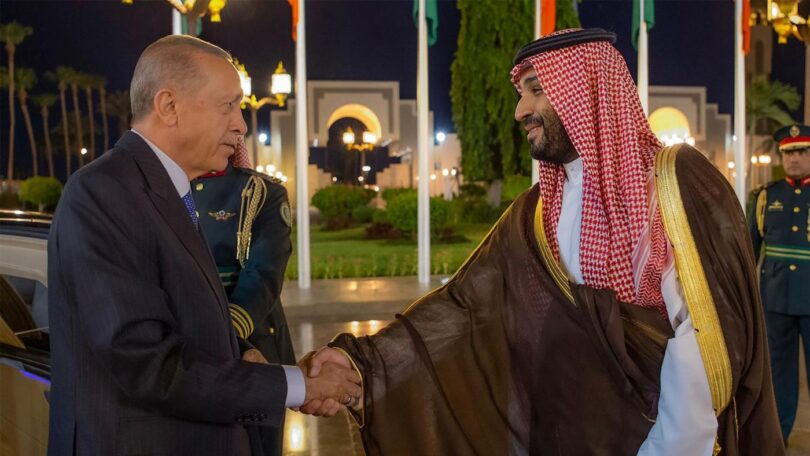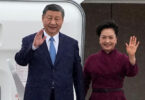According to the media, Saudi Arabia and Turkey signed a historic defense deal for the purchase of Turkish armed drones manufactured by the renowned Baykar corporation while the Saudi Crown Prince Mohammed bin Salman and Turkish President Recep Tayyib Erdogan personally attended the signing ceremony of this landmark agreement between the two countries. According to the Saudi Defense Minister, Saudi Arabia will acquire drones to enhance the readiness of the kingdom’s armed forces and bolster defense and manufacturing capabilities in the country. The Kingdom of Saudi Arabia will procure the Bayraktar Akinci (unmanned combat aerial vehicle) from Turkey, which entails cooperation on technology transfer and joint production to advance the high technology development capability of the two friendly nations. The two countries also inked several memorandums of understanding in various sectors, including energy, real estate, and direct investments.
Erdogan is currently on a mission to revive Ankara’s ties with Saudi Arabia and its constellation states including UAE, Oman, Bahrain, and Kuwait after a decades-long rift that aroused after Ankara stood in support of the Muslim Brotherhood and Arab Spring, the movement for democracy in the gulf region that shattered Arab monarchies in the Middle East and North African (MENA) region. President Recep Tayyip Erdogan landed in Jeddah, Saudi Arabia during the first leg of his weeklong tri-nation trip. During the visit to the Kingdom, Erdogan met with the top Saudi leadership and struck multiple bilateral agreements besides attending the signing ceremony of a landmark defense deal between the two brotherly nations. After Saudi Arabia, Erdogan will land in Doha followed by Abu Dhabi to lay the foundations of a new chapter of economic and defense partnerships with important Gulf nations.
Historically, Turkey had been at odds for years with the Gulf states over Ankara’s support of pro-democracy movements in the Middle East l and the murder of Saudi journalist Jamal Khashoggi in the Saudi consulate in Istanbul in 2018. Erdogan’s government launched a diplomatic initiative to mend its ties with the Middle Eastern neighbors amid serious economic challenges and domestic political pressure because of growing inflation and the high cost of living over the past two years. Earlier, the Turkish Vice President, Finance Minister and head of the Turkish central bank traveled to the UAE, the KSA and Qatar last month to discuss economic cooperation opportunities with those oil rich Gulf nations. In fact, the investments and funding from the Gulf have helped relieve pressure on Turkey’s economy and its currency reserves which went through acute depletion since 2021. Qatar and the UAE provided crucial $ 20 billion in currency swap agreements while Saudi Arabia agreed to deposit $5 billion into the Turkish reserve bank to help support the lira and dwindling Turkish economy. In fact, Teyyip Erdogan is currently reaping the benefits of his diplomatic push to repair ties with the Gulf states and help Ankara revive its struggling economy.
On the other hand, the coalition of Saudi-led Gulf Sunni states has experienced severe defense and secuirty challenges during the years-long Yemen conflict in the Middle East. The United States of America betrayed Saudi Arabia and the UAE by withdrawing crucial air defense system and strategic intelligence sharing amid heightened hostilities and across-the-border missile/ drone attacks by the Houthi militia. Historically, developing a local military industry and diversifying the Kingdom’s economy away from oil has been an important part of Crown Prince Mohammed Bin Salman’s ambitious agenda to bring a pivotal change in the political, economic, and military outlook of Saudi Arabia, that had become entirely dependent on oil export and security guarantees from Washington over the past several decades. Over the past few years, Riyadh gradually distanced itself from Washington, liberalized its economy, and introduced important economic, and social reforms that laid the foundation for modern Saudi Arabia that will compete with the challenges of the 21st century.
Interestingly, the political and strategic interests of Riyadh led Arab nations and Turkiye completely align with each other, as the majority of the Muslim countries in Western Asia and the Middle East are currently camped in anti-US bloc led by China and Russia. Meanwhile, Arab nations rejected the Biden’s plan to form a military alliance with Israel against Iran and sharply moved toward normalization of their relations with Tehran. Meanwhile Turkiye’s Erdogan, Egypt’s Alsisi and former Iraqi Prime Minister Mustafa Alhawi worked to resolve mutual disputes between various Arab nations and forge better understanding and cooperation between them. At the same time, Riyadh and Tehran felt the need to settle their issues and use their resources for the well-being and development of their nations. Currently, an economically stable and politically strong Saudi monarch intends to build it’s military muscles to deter future security threat and NATO’s sole Muslim member, Turkey was ready to provide Riyadh with modern western defense hardware to meet urgent needs of the Kingdom. This is a marriage of convenience that better suits to the needs of both parties. Realistically, Muslim Ummah has no scarcity of resources, human capital and technical expertise, only political wisdom and leaders’ sagacity was required to benefit from each other strengths and better serves the Muslims around the globe.







